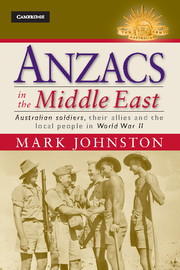Book contents
- Frontmatter
- Contents
- Photographs
- Maps
- Preface
- Acknowledgements
- Abbreviations
- Introduction
- Chapter 1 Travelling to the ‘great adventure’
- Chapter 2 ‘A different world’
- Chapter 3 ‘They're troublesome, you know’
- Chapter 4 ‘Fighting shoulder to shoulder’
- Chapter 5 ‘Australia, Australia, you are good’
- Chapter 6 ‘Unity of feeling and purpose’
- Chapter 7 ‘They treat us as a dependent nation’
- Chapter 8 ‘Gyppo Land’
- Conclusion
- Notes
- Bibliography
- Index
Conclusion
Published online by Cambridge University Press: 05 February 2013
- Frontmatter
- Contents
- Photographs
- Maps
- Preface
- Acknowledgements
- Abbreviations
- Introduction
- Chapter 1 Travelling to the ‘great adventure’
- Chapter 2 ‘A different world’
- Chapter 3 ‘They're troublesome, you know’
- Chapter 4 ‘Fighting shoulder to shoulder’
- Chapter 5 ‘Australia, Australia, you are good’
- Chapter 6 ‘Unity of feeling and purpose’
- Chapter 7 ‘They treat us as a dependent nation’
- Chapter 8 ‘Gyppo Land’
- Conclusion
- Notes
- Bibliography
- Index
Summary
In June 1942 General Morshead sent a letter to Headquarters in Australia concerning the return to Australia of soldiers in two categories: SUS – ‘soldiers under sentence’ – and SNLR – ‘services no longer required’. This was in response to a memo about a very trying voyage from the Middle East in April that year. The transport ship Felix Roussel, which was designed to carry 1600 men, instead took 2102. Among them were seventy-five soldiers under sentence and thirty-four SNLR. Owing to the crowding, the SUS could not be fully segregated from the others, or guarded properly, and there were only six cells. They were moved three times in the course of the voyage. Reading between the lines of an official memo, the SUS, SNLR and undisciplined elements among the rest of the troops caused havoc. The report says that more than once, ‘soldiers under sentence broke out of their cells by heaving against the wooden walls and breaking them, and at Durban fifteen SUS escaped through portholes’. On another occasion there was ‘a serious disturbance’ when ‘a body of men led by services no longer required personnel endeavoured to release the soldiers under sentence’. There were many other disturbances. Eighteen courts martial were held on board, although there seem to have been grounds for more.
The memo finished with a request not to send SUS on crowded troopships, and Morshead responded with a discussion of fifty soldiers he intended to send on a transport in which space would be provided for that number. Morshead indicated that these men should on getting home serve out their sentences and be discharged SNLR. This story is instructive. The 110 SUS and SNLR men on the Felix Roussel had caused headaches for those in charge of the ship, but presumably the vast majority of the other 2000 men on board behaved well. That 2000, or 95 per cent of those on board, was more like the typical Australian soldier than the troublesome 110 or so, even if the latter were abetted by some. Similarly, when Morshead was enumerating troublemakers, the total of fifty was tiny compared to the more than 30 000 Australians in the Middle East at the time.
- Type
- Chapter
- Information
- Anzacs in the Middle EastAustralian Soldiers, their Allies and the Local People in World War II, pp. 204 - 209Publisher: Cambridge University PressPrint publication year: 2012



